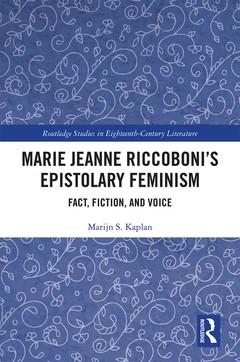Marie Jeanne Riccoboni’s Epistolary Feminism Fact, Fiction, and Voice Routledge Studies in Eighteenth-Century Literature Series
Auteur : Kaplan Marijn S.

Marie Jeanne Riccoboni?s Epistolary Feminism: Fact, Fiction, and Voice argues that Riccoboni is among the most significant women writers of the French Enlightenment due to her "epistolary feminism". Locating its source in her first novel Lettres de Mistriss Fanni Butlerd (1757), between fact and fiction, public and private, Marijn S. Kaplan provides new evidence supporting both the novel?s autobiography theory and de Maillebois hypothesis. Kaplan then traces how Riccoboni progressively develops a proto-feminist poetics of voice in her epistolary fiction, empowering women to resist patriarchal efforts to silence and appropriate them, which culminates in her final novel Lettres de Milord Rivers (1777). In nineteen relatively unknown letters (included, with translations) written over three decades to her publisher Humblot, several editors, Diderot, Laclos, Philip Thicknesse etc., Riccoboni is shown similarly to defend her oeuvre, her reputation, and her authority as a woman (writer), refusing to be manipulated and silenced by men.
Introduction
PART ONE: RICCOBONI’S FICTION
Chapter 1: Lettres de Fanni Butlerd (1757):
The Facts of Fiction and the Fiction of Facts
Chapter 2: Proto-Feminist Female Identity through Marginal Epistolarity:
From Lettres de Juliette Catesby (1759) to Histoire de Miss Jenny
(1764)
Chapter 3: Perfecting Epistolary Feminism:
From Lettres d’Adélaïde de Dammartin (1767) to Lettres de Sophie
de Vallière (1772)
Chapter 4: Culminating Epistolary Feminism:
Lettres de Mylord Rivers (1777)
Chapter 5: Epistolary Feminism Attacked in Translation:
Percival Stockdale’s Letters from Lord Rivers (1778)
PART TWO: RICCOBONI’S CORRESPONDENCE
Chapter 6: Epistolary Feminism and Letters
Chapter 7: Final Published Letters: Thicknesse (1780) and Laclos (1782)
Conclusion
Appendix
Marijn S. Kaplan is a Professor of French at the University of North Texas, where she also chairs the Department of World Languages, Literatures and Cultures. She has published extensively on eighteenth-century French women writers—particularly Marie-Jeanne Riccoboni, Françoise de Graffigny, and Sophie Cottin—epistolary fiction, and correspondence.
Date de parution : 05-2023
15.2x22.9 cm
Date de parution : 05-2020
15.2x22.9 cm
Thème de Marie Jeanne Riccoboni’s Epistolary Feminism :
Mots-clés :
De La Fayette; French enlightenment; De Graffigny’s Lettres; proto-feminist poetics; Unconsummated Marriage; epistolary feminism; Young Man; de Maillebois hypothesis; Madame Riccoboni; Madame De Merteuil; De Dammartin; England’s Envoy; Lettres De; Epistolary Fiction; Roundabout; Epistolary Narrative; Mercure De France; Son Amie; Madame De; Sophie De; Female Voice; Male Voice; La Fayette; De Merteuil; Editorial Postscript; Sophie’s Letters; Female Corpus; Mme De Merteuil; Il Ne



